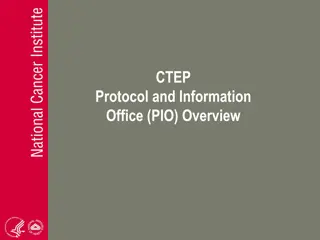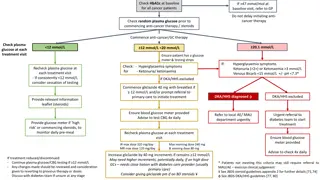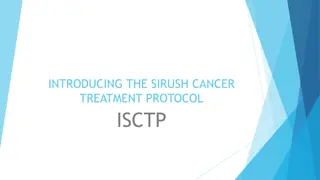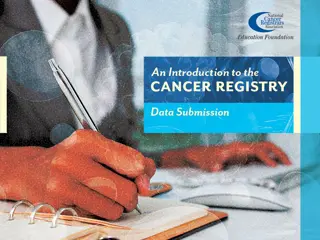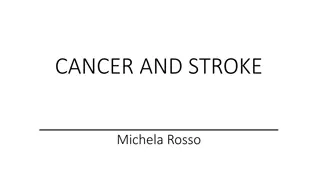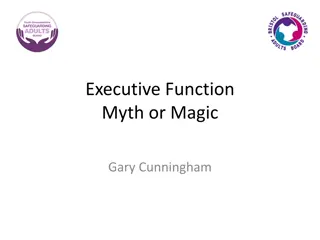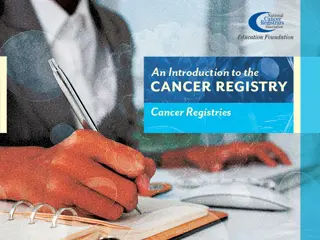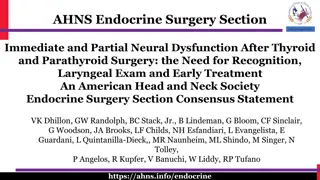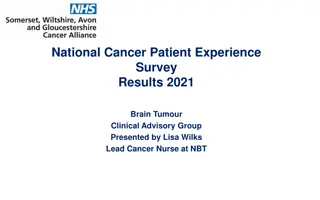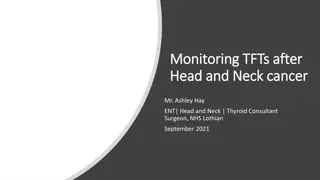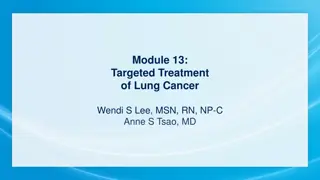Addressing Cognitive Dysfunction in Patients with Cancer: Causes, Impact, and Treatment
Understanding cognitive dysfunction in cancer patients is crucial for improving quality of life and medical outcomes. This article explores the background, causes, screening, diagnosis, and treatment options for cancer-related cognitive impairment, emphasizing the historical perspective, prevalence, quality of cognitive problems reported post-treatment, and the significance of cognitive dysfunction in cancer survivors.
Download Presentation

Please find below an Image/Link to download the presentation.
The content on the website is provided AS IS for your information and personal use only. It may not be sold, licensed, or shared on other websites without obtaining consent from the author.If you encounter any issues during the download, it is possible that the publisher has removed the file from their server.
You are allowed to download the files provided on this website for personal or commercial use, subject to the condition that they are used lawfully. All files are the property of their respective owners.
The content on the website is provided AS IS for your information and personal use only. It may not be sold, licensed, or shared on other websites without obtaining consent from the author.
E N D
Presentation Transcript
ADDRESSING COGNITIVE DYSFUNCTION IN PATIENTS WITH CANCER Zev Nakamura, MD Assistant Professor Department of Psychiatry Lineberger Comprehensive Cancer Center Patient Centered Care Series 7/14/2021
OUTLINE Background Causes and underlying mechanisms Screening and diagnosis Treatment LCCC 1921: Memantine for prevention of cognitive decline in patients with breast cancer
LEARNING OBJECTIVES 1. Identify causes of cancer-related cognitive dysfunction 2. Describe the impact of cognitive problems in cancer patients on quality of life and medical outcomes 3. Recognize available treatments for patients with cancer experiencing cognitive dysfunction
HISTORICAL PERSPECTIVE Awareness since 1970s - Serial Cognitive Testing in Cancer Patients Receiving Chemotherapy (Oxman 1980) Chemobrain defined in late 1990s in cross-sectional studies in breast CA 2002 Ahles et al. showed long-term effects of chemo 2004 Wefel et al. first prospective longitudinal study Growing appreciation for cognitive difficulties resulting from cancer and its treatments over the last 15-20 years (i.e. CRCD, CRCI, Tumor brain )
PREVALENCE OF CRCI Up to 30% with cognitive impairment before treatment 75% report cognitive deficits during treatment 15-50% exhibit objective impairment for years after treatment Janelsins 2014, Ahles 2018
QUALITY OF COGNITIVE PROBLEMS REPORTED POST-TREATMENT Memory Concentration Executive function Ability to learn new material Subtle (usually) or dramatic Variable course
SIGNIFICANCE OF CRCI Associations adverse mental health inability to return to work worse emotional and social well-being impaired physical function increased mortality Greater influence on chemotherapy prescribing than age or functional status Worsens medication compliance One of the most feared problems among cancer survivors Janelsins 2014, Yang 2018, Von Ah 2021, Von Ah 2015, Klaver 2020, Nakamura 2020, Hshieh 2018, Mohile 2018
OVERARCHING MECHANISMS Direct toxicity Cytokine-mediated neuroinflammation Oxidative stress Genetic risk factors Survivors w/ APOEe4 with worse cognitive problems Breast CA survivors treated w/ chemotherapy with COMTVal158Met had greater decline BDNF Met/Met genotype protective against chemo-induced cognitive changes Ahles 2018, Ahles 2014, Wefel 2015, Mandelblatt 2018
IMAGING FINDINGS gray matter volume white matter connectivity Altered functional brain activation and connectivity Decreased volume and connectivity correlate with worse function Sousa 2020, Kaiser 2014, Kesler 2020, Kesler 2014, Deprez 2018, Amidi 2019
INFLAMMATION Associated with risk for cancer and neurocognitive disorders cytokine levels in CA pts at baseline relative to controls during chemo and (but stay elevated) with time Correlate with self-reported and objective cognitive Strongest data for TNF , IL-6, and IL-1 Patel 2015, Wang 2016, Kesler 2013 (Landmark Study), Lyon 2016, Hoogland 2019
CANCER TREATMENT AND AGING Chronic inflammation Increased oxidative stress Accumulation of DNA damage Shortening of telomeres Increased cell senescence Increased expression of p16INK4a and ARF in breast cancer patients (estimated 10 yrs of aging) Increased activation of ERK and AKT signaling pathways in rats Sanoff 2014, Salas-Ramirez 2015
CANCER/TUMOR Non-CNS Cancers Immune system dysfunction disrupt brain structure and function Feeling physically ill, fatigued, depressed, etc. Primary brain tumors and brain metastases Intracranial pressure Edema Displacement of brain tissue blood supply
CHEMOTHERAPY Most chemo cannot cross the BBB CA increases BBB permeability Even small amounts can cause significant damage Toxic to neural progenitor cells Increases levels of pro-inflammatory cytokines Cytokines increase BBB permeability Elevated cytokines can lead to damage through oxidative stress and DNA damage Diminution of neurogenesis Disruption of myelin and oligodendrocyte precursors Mitochondrial dysfunction Hodgson 2013 (Landmark), El-Agamy 2019, Ren 2019, Lange 2019
SURGERY Mastectomy implicated in cognitive effects May be 2/2 increased inflammation, pain, psychological effects Impact of anesthesia (especially in elderly) In pts w/ brain tumors, can improve or worsen cognitive function Reid-Arndt 2012 (Landmark), Cimprich 2010 (Landmark), Su 2020
RADIATION Cranial, Head & Neck Radiation necrosis Disrupts creation of new neurons in the hippocampus Local Some evidence for adverse cognitive effects Mechanisms Chronic oxidative stress and inflammation Neuronal damage Changes to BBB, ischemia, oligodendrocyte function Wilke 2018, Dong 2015, Carvalho 2018
HORMONAL THERAPY Estrogen and testosterone support brain function Tamoxifen and aromatase inhibitors Smaller hippocampal size Combination with chemo may lead to greater cognitive difficulties Other studies show no association ADT with adverse cognitive consequences Ganz 2014, Van Dyk 2019, Le Rhun 2015, Morote 2017, Bender 2015, Gonzalez 2015
IMMUNOTHERAPY Checkpoint inhibitors increasingly important treatment for many cancers May lead to neuroinflammation, which in combination with radiation or other immunotherapies could cause cognitive impairment Reports of cognitive impairment in clinical trials, but further research needed CAR T cell therapy associated with a profound, immune-mediated encephalopathy in ~30%, but long-term effects not known Topalian 2012 (Landmark), McGinnis 2017, Goldberg 2016, Joly 2020
TARGETED THERAPIES Monoclonal antibodies and small-molecule tyrosine kinase inhibitors also increasingly common Anti-VEGF antibody bevacizumab associated with objective global cognitive decline Improvement in cognitive function in patients with metastatic RCC or GIST tumors receiving sorafenib or sunitinb Chronic encephalopathy in some MM patients exposed to proteasome inhibitors Long-term sequelae not studied Fathpour 2014, Gilbert 2014, Ng 2018, Mulder 2014, Wick 2016
COMORBIDITIES AFFECTING COGNITIVE FUNCTION Sleep disorders (insomnia, sleep apnea) Depression, anxiety, distress Pain and pain medications Other physical illnesses Fatigue Anemia
SELF-REPORT VS. OBJECTIVE MEASUREMENT Self-reported problems more common Self-report limitations Is it really measuring cognitive impairment? Objective measurement limitations Is it sensitive enough? Logistically feasible?
MEASUREMENT OF CRCI No standard for screening, monitoring Self-report measures: PROMIS Cognitive Function, FACT- Cog, EORTC-QLQ-30, PRO-CTCAE Objective screening instruments: MMSE, MOCA, RBANS, BOMC Neuropsychological Assessment (NPA) * Gold Standard ICCTF recommends: Hopkins Verbal Learning Test, Trail Making Test, Controlled Oral Word Association Test
MEASUREMENT IN THE CLINIC Self-report screeners Primary care Oncology Objective Screening Instruments Psychiatry, Psychology, Neurology Occupational Therapy Speech Therapy Neuropsychological Assessment Neuropsychology
INTERVENTIONS STUDIED FOR CRCI Behavioral: Cognitive rehabilitation, Cognitive Training, Combination Physical activity: Yoga, Exercise programs Mind-Body: Meditation, Mindfulness, Acupuncture Pharmacotherapies: Donepezil, Memantine, Modafinil, Methylphenidate, Epo-stimulating agents, Vitamin E, Ginkgo biloba, SSRIs
COGNITIVE TRAINING Repetitive, increasing challenging tasks (often via computer) to improve, maintain, or restore cognitive function Start out with 4-5, 30-60 min sessions per week for at least 6 weeks Research ~ 10 studies Primarily in early stage breast CA survivors Completed adjuvant therapy and were reporting cognitive concerns Fernandez 2019, Mayo 2020
COGNITIVE REHABILITATION self-awareness to support problem-solving and compensatory strategies Initially developed in TBI and stroke populations Usually weekly therapy for 30-60 min with neuropsychologist, occupational therapist, speech/language pathologist Research ~10 studies Individual and group delivery (in person or online) 4-7 sessions Improve cognitive symptoms > neuropsychological performance Fernandez 2019, Mayo 2020
PHYSICAL ACTIVITY new neurons in the hippocampus, BDNF levels, reduces inflammation risk of Alzheimer s and slows age-related cognitive decline Moderate intensity exercise at least 150 min/week OR vigorous exercise at least 120 min/week Local Resources Get REAL & HEEL Health Coaching LIVESTRONG at the YMCA Yoga Campbell 2018, Zimmer 2016, Myers 2018, Campbell 2020
MIND-BODY Bring an awareness of individual potential for healing or restoration Guided imagery, meditation, mindfulness-based stress reduction, neuro/biofeedback, and acupuncture Mindfulness UCLA MAPS classes Apps: The Mindfulness App (1&II), Sitting Still, Headspace, Insight Timer, Mindfulness Bell Local courses through UNC-Chapel Hill Program on Integrative Medicine and Duke Integrative Medicine Acupuncture UNC Family Medicine Acupuncture Clinic NC Society of Acupuncture and Asian Medicine Freeman 2014, Milbury 2013, Hoffman 2012, Johns 2016, Alvarez 2013, Johnston 2011, Cimprich 1993, Cimprich and Ronis 2003, Van der Gucht 2020
MEDICATIONS Stimulants (methylphenidate and modafinil) Alzheimer s drugs (donepezil and memantine) SSRIs (sertraline and paroxetine) Ginkgo biloba Vitamin E Erythropoietin-Stimulating agents* Weigh risk/benefit Karschnia 2019, Miladi 2019, Mayo 2020
MEDICATIONS Fewer than 10 published RCTs Only 3 agents that have been studied as prevention Epo-stimulating agents: not effective + adverse effects Methylphenidate: closed prematurely due poor recruitment Ginkgo Biloba: Large study, not effective Karschnia 2019, Mayo 2020
LCCC 1921: MEMANTINE FOR PREVENTION OF COGNITIVE DECLINE IN PATIENTS WITH BREAST CANCER
CAN MEMANTINE HELP? A pill taken by mouth Blocks harmful inflammation in the brain Why for Chemo Brain? Decades of safety data What is it? Helpful for patients during brain radiation Most studied for Alzheimer s disease, but effective in many medical conditions Prevented chemo brain in animal studies McShane 2006 (Landmark), Brown 2013 (Landmark), Cole 2013 (Landmark)
INFLAMMATORY HYPOTHESIS OF CRCI Inflammatory cytokines: 1.) elevated in cancer 2.) increase during chemotherapy 3.) correlate with cognitive deficits Olmos and Llado 2014
ABOUT THE STUDY What is the purpose of the study? We want to learn if giving memantine can prevent cognitive changes in people with breast cancer who are receiving chemotherapy. What will be done? Patients will be given memantine during chemotherapy. This is a pill taken two times each day. Cognition will be tested with cognitive tasks and surveys over ~1 hour. Before starting chemotherapy 4 weeks after ending chemotherapy. Patients will receive a $25 gift card for each survey.
MORE INFORMATION IF YOU ARE INTERESTED Eligibility Criteria Contact us Are 18 years old or older e-mail: Have stage I, II, or III breast cancer Are scheduled to begin chemotherapy at UNC Chapel Hill, UNC Hillsborough, or UNC REX Speak English Zev Nakamura, MD zev_nakamura@med.unc.edu Or Yesy Lopez, BA yesy_lopez@med.unc.edu






